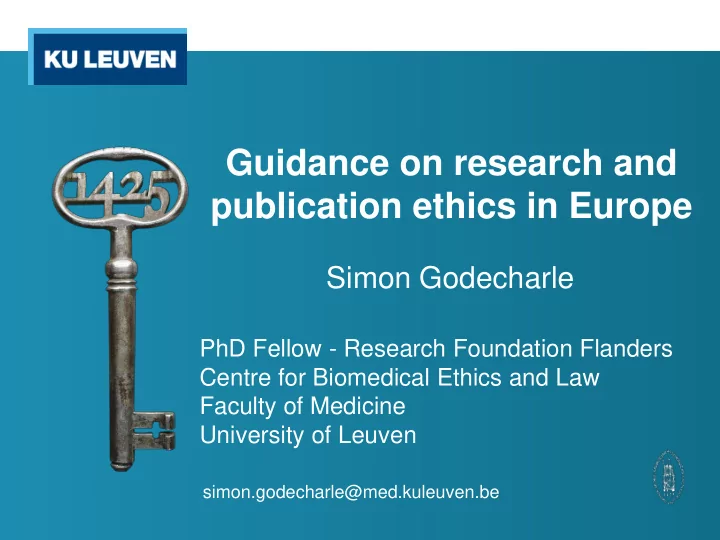

Guidance on research and publication ethics in Europe Simon Godecharle PhD Fellow - Research Foundation Flanders Centre for Biomedical Ethics and Law Faculty of Medicine University of Leuven simon.godecharle@med.kuleuven.be
Table of Content • Background • Guidance on research integrity in Europe • Publication issues • Detecting research misconduct • Conclusion 2 simon.godecharle@med.kuleuven.be
Background 3 simon.godecharle@med.kuleuven.be
Guidance? 4 simon.godecharle@med.kuleuven.be
Results • Methodology: Extensive internet search National bio-ethics committees (WHO); national academies of sciences (ALLEA); national frameworks National association of universities or expert • More then 340 e-mails were sent • Received replies from 30 out of the 31 target countries 5 simon.godecharle@med.kuleuven.be
Results • Inclusion: English, French, German, Dutch or Italian • 19 of the 31 countries included (= 87% of total research output of target population) • 49 guidance documents • 90% were published between 2002 and 2012 6 simon.godecharle@med.kuleuven.be
Results • The number of words ranged from 139 to 57287 words (median: 2467 words, 25th-75th percentile: 1377-5795) • International and national heterogeneity: origins and content 7 simon.godecharle@med.kuleuven.be
National framework (law) National framework /equivalent No national framework Could not be included Godecharle, S., et al. (2013). Guidance on research integrity: 8 no union in Europe. The Lancet, 381 (9872), 1097-1098. simon.godecharle@med.kuleuven.be
Results Themes discussed: • Defining of research integrity and research misconduct • Is research integrity important? trust and reputation • Threats towards research integrity • Factors influencing misconduct: competition 9 simon.godecharle@med.kuleuven.be
Results • Detecting research misconduct • Dealing with allegations of misconduct • Prevention: training and education Content? Format? Timing? Frequency? Who can teach? Who should learn?* (*Godecharle, S., Nemery, B., Dierickx, K. (2013). Integrity Training: Conflicting Practices. Science, 340 (6139), 1403.) 10 simon.godecharle@med.kuleuven.be
Different approaches Negative approach: actions included in clear Positive approach: principles of integrity definitions of misconduct Fabrication Honesty Falsification Reliability Plagiarism Impartiality Objectivity Possible intention Deception Openness or open communication Mismanagement of primary data and/or materials Responsibility for future generations through Violation of the law education or training and skills Violation of intellectual property Independence Misrepresentation Integrity Fraud Duty of care Fraudulent claims of authorship Verifiability Misconduct regarding publication Accountability Facilitating misconduct Rigour Breach of confidence as a reviewer or supervisor 11 simon.godecharle@med.kuleuven.be
Publication Issues 12 simon.godecharle@med.kuleuven.be
Why publish? • Researchers are obliged to disseminate their results to the wider research society or society in general • Publication is valued as an intrinsic part of research • Research: risks - potential benefits (e.g. medical or scientific advances) Placing participants at risk without the opportunity for any benefit, is unethical 13 simon.godecharle@med.kuleuven.be
Why publish? • Originality and quality = more important than producing results quickly or publishing as much as possible, especially as a criterion for: earning academic degrees career advancement allocation of resources the assessment of research performance 14 simon.godecharle@med.kuleuven.be
Authorship • Only 7 of the 19 countries: refer to the International Committee of Medical Journal Editors • Author: a creative contribution • Latvian guideline emphasizes creativity, however: “ Only on the author’s (or authors’) own initiative, by tradition, the leader of the scientific school (or the scientific advisor) can be mentioned as a co-author, putting his surname as the last one. ” 15 simon.godecharle@med.kuleuven.be
Authorship • Link between authorship and responsibility • No agreement exists on what the authors are responsible for. Authors are responsible for the integrity of: the entire project the work honesty in research the published content 16 simon.godecharle@med.kuleuven.be
Authorship • Definition of misconduct: Heterogeneity Fabrication, falsification, plagiarism • Fabrication, falsification and plagiarism = most serious forms of misconduct • Several guidelines: gradation in definition of misconduct serious forms of misconduct vs less serious forms 17 simon.godecharle@med.kuleuven.be
Authorship The following forms of misconduct concerning publication and authorship are explicitly condemned by several guidelines: Selective publication of desirable results Ghost authorship Honorary or gift authorship 18 simon.godecharle@med.kuleuven.be
Authorship Plagiarism: • Many actions may be considered to constitute plagiarism: coping long text passages without attribution, up to careless or even inadvertent use of the ideas of someone else • Unlike fabrication and falsification, plagiarism “is supposed to be more injurious to fellow scientists than to science as such.” (European Code of Conduct for Research Integrity) 19 simon.godecharle@med.kuleuven.be
Authorship • An Irish guideline: “ the European approach ” • Only one guideline also made this normative qualification: “(… ) cases of misconduct related to falsification of research results are much more dangerous to science and its structures than plagiarism, which is easier to detect. ” (Polish guideline) 20 simon.godecharle@med.kuleuven.be
Authorship • This normative qualification implies that a scientific finding is not less true when it is plagiarized • Focus on (possible) impact of certain actions on science • Following the same logic, continued carelessness, might be considered as serious as fabrication • Who can assess long or short term impact? Who can determine the intention? 21 simon.godecharle@med.kuleuven.be
Detecting research misconduct 22 simon.godecharle@med.kuleuven.be
Peer review • Peer review is valued as a crucial part of research and for safeguarding research integrity • Reviewers should act with the greatest integrity, objectivity and thoroughness 23 simon.godecharle@med.kuleuven.be
Peer review • Peer review is considered to be necessary, but insufficient • Effective? reviewers do not have the original data nor the time to verify the results the review process, like the whole of science, depends on trust the volume of manuscripts: difficult to find willing and competent reviewers or referees 24 simon.godecharle@med.kuleuven.be
Conclusion 25 simon.godecharle@med.kuleuven.be
Conclusion • Heterogeneity results in a confusing situation • Need for harmonisation? Several international initiatives ESF European Code of Conduct vs. Hungarian guidance document • Difficulty to retrieve the guidance documents 26 simon.godecharle@med.kuleuven.be
Conclusion • The confusing situation hampers international research • Ever more guidance documents, ever more heterogeneity? • Researcher as a tightrope walker 27 simon.godecharle@med.kuleuven.be
Conclusion 28 simon.godecharle@med.kuleuven.be
Thank you for your attention • Prof Kris Dierickx • Prof Ben Nemery • Research Foundation - Flanders (FWO) 29
Recommend
More recommend